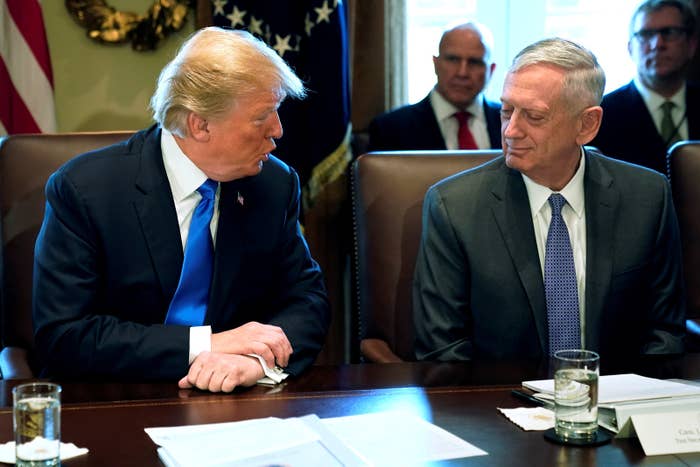
Openly transgender people will be allowed to sign up to join the US military come Jan. 1.
The Trump administration had been fighting — unsuccessfully — to allow for the indefinite delay of that date, as sought by President Trump, or at least for Defense Secretary James Mattis, to be able to delay the date if he wished to do so on his own authority.
Over the past week, however, it appeared the Trump administration had given up the fight to stop the Jan. 1 deadline from going into effect — and the relevant administration officials had gone quiet on the matter.
On Friday night, however, the Justice Department confirmed that they would be allowing the Jan. 1 date to going into effect unimpeded.
"The Department of Defense has announced that it will be releasing an independent study of these issues in the coming weeks. So rather than litigate this interim appeal before that occurs, the administration has decided to wait for DOD's study and will continue to defend the President's and Secretary of Defense’s lawful authority in district court in the meantime," a Justice Department official told BuzzFeed News in a statement.
Those who had challenged the Trump administration effort to halt transgender military service celebrated the news as "a major victory" in the ongoing lawsuits.
"There was never any legitimate reason for President Trump to upset the military’s existing policy on transgender troops," Shannon Minter, an attorney with the National Center for Lesbian Rights who is representing the plaintiffs in the case out of DC, told BuzzFeed News on Friday night. "We are hopeful the Department of Defense will once again confirm that excluding transgender people from military service would serve only to deprive the Armed Forces of dedicated service members and undermine our national security."
The decision by the Justice Department followed repeated losses in court on the issue. On Dec. 21, the US Court of Appeals for the 4th Circuit denied the Justice Department's request to put a lower court's order regarding the date — the accession deadline — on hold, allowing for further delay. The next day, in a more detailed order, the US Court of Appeals for the DC Circuit reached the same conclusion. There are also two other injunctions out of district courts within the US Court of Appeals for the 9th Circuit.
The only real move left for the administration, then, would have been to seek a ruling from the Supreme Court putting all of those lower court injunctions partially on hold by allowing Mattis to delay the accession deadline again.
The Justice Department has frequently turned to the justices over the past year when attempting to reverse — or at least water down — lower court rulings. The administration has gone that route for the various iterations of the travel ban, litigation over the planned ending of the Deferred Action for Childhood Arrivals (DACA) program, the initial case over an undocumented teen in federal custody seeking an abortion, and more.
Here, however, the Justice Department decided against doing so.
At the same time, the Justice Department also decided to stop fighting its appeals of three of the preliminary injunctions against Trump's policy — which addressed accession, as well as retention of currently serving transgender service members and transgender service members' medical care — choosing instead to address the case at the district court, where the challengers ultimately want a permanent injunction against Trump's policy.
That decision means the preliminary injunctions against Trump's transgender service policy will remain in effect until the litigation on the permanent injunctions — which will be a much slower timeline — is completed and, if it proceeds, goes on to its own appeals.
The accession date, which was set for Jan. 1, 2018, by Mattis earlier this year, itself was a six-month extension of the July 1, 2017, date initially set by his Obama-era predecessor, Ashton Carter. (Transgender people already serving in the military have been allowed to continue to serve openly since mid-2016.)
Then came Trump's tweets in late July opposing all transgender military service, the policy that followed attempting to partially implement those tweets, the lawsuits challenging that policy, and four injunctions from courts from Washington, DC, to Washington state halting enforcement of that policy.
The transgender people who want to join up were still waiting, though, because the Trump administration wasn't saying whether it was going to let the date pass without more of a legal fight.
"It’s tough for individuals who have been waiting to enlist, in some cases for years, to endure these final days of uncertainty, but they are hopeful and resolved to see this through, no matter what," Minter told BuzzFeed News on Thursday.
The military does, in fact, already have its plan in place for allowing transgender people to join the military if they meet certain criteria. A Pentagon spokesperson told BuzzFeed News, "The DoD is preparing to access transgender applicants beginning Jan 1 in accordance with the federal court ruling."
Beyond that, though, Defense Department and Justice Department spokespeople were only saying that there were no updates since a statement from the day of the 4th Circuit's ruling. At that time, a Justice Department spokesperson said, "We disagree with the Court’s ruling and are currently evaluating the next steps."
UPDATE
This story was updated with the Justice Department's Friday evening comment and court filings.
UPDATE
This story was updated with comment from a lawyer challenging the Trump administration policy.

